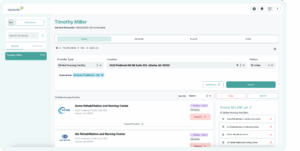Care transitions remain one of the most critical and vulnerable points in the patient care journey. While the healthcare system has made significant progress in clinical innovation, many hospitals and health systems continue to rely on outdated discharge practices. These fragmented workflows contribute to delays, readmissions, increased administrative burden, and weakened performance in value-based care (VBC) models.
Strategic investments in digital tools and data integration can transform the discharge process into a driver of efficiency, coordination, and improved patient experience.
This article explores the key challenges in traditional discharge workflows and how solutions from Trella Health and Repisodic are enabling smarter, more connected care transitions.
Challenge 1: Fragmented, Manual Discharge Workflows in the Healthcare System
Many hospitals and health systems still rely on static provider lists and manual workflows to manage discharge planning. Case managers often have limited visibility into post-acute provider capacity, quality, or suitability for specific patient needs.
As a result, referrals are made with incomplete information, leading to inefficiencies, care mismatches, and increased readmission risk. This issue is especially critical in complex care scenarios, where treatment plans must align with a patient’s evolving health status and broader healthcare services.
 Solution: Insight-Driven Digital Referral Tools for Successful Transition
Solution: Insight-Driven Digital Referral Tools for Successful Transition
Modern referral platforms offer real-time access to provider performance data, availability, and services. These tools allow care teams to make informed, timely, and patient-centered referrals. By moving from static lists to dynamic, digital workflows, organizations can streamline the discharge process, support patient outcomes, and strengthen care continuity.
Challenge 2: The Shotgun Approach to Referrals
In many health systems, the common practice is to send discharge referrals to every available post-acute provider. This “shotgun” method results in multiple providers contacting the same patient, overwhelming intake coordinators, delaying placements, and creating a poor experience for patients and families. It also dilutes strategic referral alignment efforts.
Solution: Decision-Making and Network Alignment for Better Patient Care
With a modern discharge platform tool, hospitals can deliver a more personalized referral experience while guiding patients toward high-performing, in-network providers. This tool supports both patient choice and strategic network utilization by leveraging data on provider quality, outcomes, and alignment. The result is a more efficient placement process, improved patient satisfaction, and better use of preferred post-acute partners.
Challenge 3: Readmissions Undermining Value-Based Care Performance
Under value-based care models, hospitals face growing pressure to reduce readmissions and improve long-term patient outcomes. However, when discharge planning lacks insight and coordination, patients are more likely to fall through the cracks after leaving the hospital, leading to avoidable returns and higher total cost of care.
Solution: Targeted, Data-Informed Referrals That Reduce Readmissions
Performance data helps enable smarter referral decisions that match patients with providers capable of delivering appropriate, high-quality care. Combined with a discharge automation platform, care teams can confidently refer patients to providers most likely to support a successful recovery, reducing readmission risk and improving overall value-based care performance. Incorporating treatment history and medical background, sourced directly from the EHR via an EHR integration, into referral decisions supports better alignment with each patient’s unique needs.
Challenge 4: Lack of Scalability in Care Coordination
Manual, paper-based discharge processes do not scale efficiently. As patient volumes grow and complexity increases, clinical teams struggle to manage transitions effectively. This leads to staff burnout, workflow inefficiencies, and inconsistent patient experiences across the care continuum.
Solution: Scalable, Technology-Enabled Case Management
Scalable, digital tools can streamline case management and discharge workflows. These platforms automate repetitive tasks, reduce administrative overhead, and enable better coordination between hospital and post-acute teams.
With these improvements, healthcare systems are better able to provide care to individual patients in a more personalized and timely manner.

The Value of an Combined Approach: Trella Health + Repisodic
The combination of Repisodic’s digital discharge platform with Trella Health’s Market Insights and CRM (customer relationship management) platform offers a comprehensive solution to the challenges of transitional care. Together, they provide:
- Real-Time Provider Visibility: Access up-to-date data on post-acute provider quality, capacity, and performance to make informed, patient-specific referral decisions.
- Preferred Network Alignment: Reduce referral leakage and strengthen strategic partnerships by keeping patients within your high-performing, in-network providers.
- Scalable, Patient-Centered Workflows: Automate and personalize discharge planning to meet each patient’s unique clinical needs and streamline coordination across care teams.
- Data-Driven Insights for Value-Based Care Success: Leverage analytics to monitor trends regarding readmission rates, total cost of care, and overall care quality in alignment with value-based goals.
- Improved Collaboration and Communication: Connect hospitals and post-acute providers through a unified platform, enhancing workflow efficiency and care coordination.
- Stronger Patient Engagement: Empower patients and families with clear provider information and choices, leading to higher satisfaction and better transitions of care.
This end-to-end approach empowers hospitals, skilled nursing facilities, home health agencies, and other post-acute partners to work more collaboratively, ensuring each patient is connected to the right care at the right time.
Take the Next Step
Organizations that invest in modern care transition solutions are better equipped to meet today’s value-based care expectations and tomorrow’s care delivery challenges.
Request a demo to learn how Trella Health and Repisodic can help transform your discharge planning process, improve outcomes, and strengthen your post-acute care network.
















